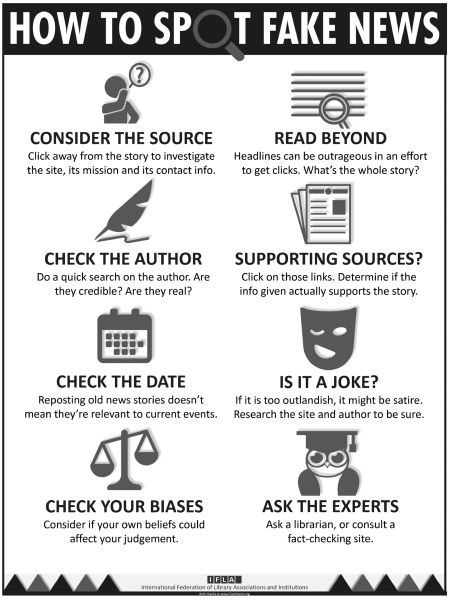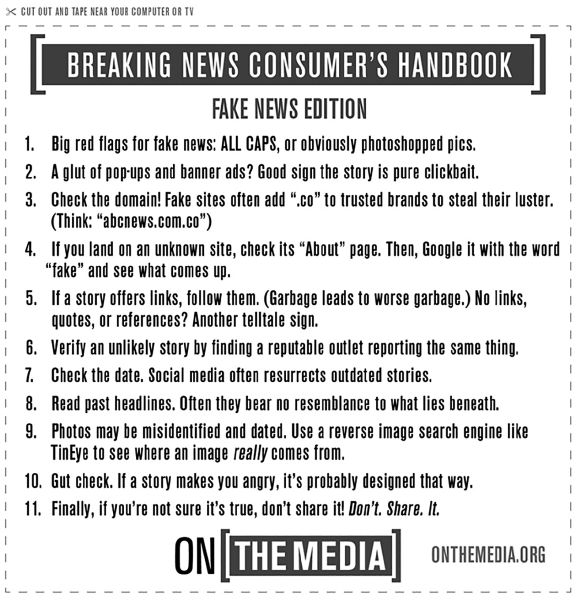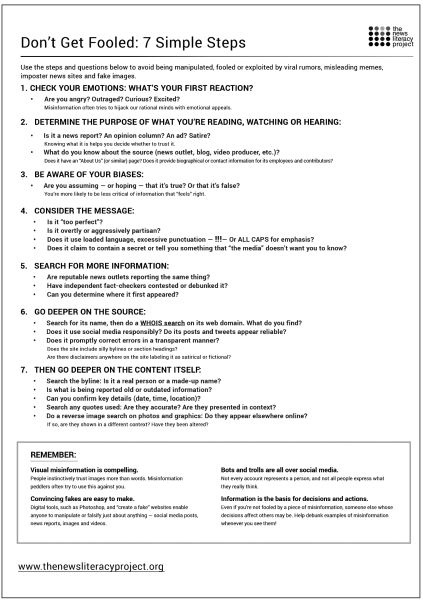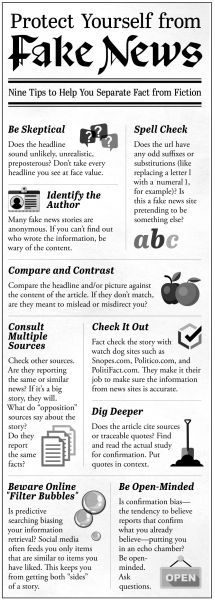APPENDIX
ADDITIONAL RESOURCES
In February 2017, I presented a webinar for the American Library Association on the topic of fake news; it was this webinar that inspired this report. A recording of the webinar is referenced here:
Cooke, N. A. “Post-Truth: Fake News and a New Era of Information Literacy.” Programming Librarian: A Website of the American Library Association Public Programs Office. February 2017. (Invited webinar). http://programminglibrarian.org/learn/post-truth-fake-news-and-new-era-information-literacy.
A Pinterest site was created to supplement this webinar; the site contains hundreds of bookmarks to articles, lesson plans, videos, and other information related to the fake news phenomenon. It can be found here: https://www.pinterest.com/nicolecooke/fake-news-alternative-facts-critical-literacy.
THE LARGER CONTEXT OF FAKE NEWS—SUGGESTED BOOKS
Booth, Char. Reflective Teaching, Effective Learning: Instructional Literacy for Library Educators. American Library Association, 2011.
Boyd, Danah. It’s Complicated: The Social Lives of Networked Teens. Yale University Press, 2014.
Carr, Nicholas. The Shallows: What the Internet Is Doing to Our Brains. W. W. Norton, 2011.
Kovach, Bill, and Tom Rosenstiel. Blur: How to Know What’s True in the Age of Information Overload. Bloomsbury Publishing USA, 2011.
Levitin, Daniel J. A Field Guide to Lies: Critical Thinking in the Information Age. Penguin, 2016.
———. The Organized Mind: Thinking Straight in the Age of Information Overload. Penguin, 2014.
Pariser, Eli. The Filter Bubble: What the Internet Is Hiding from You. Penguin UK, 2011.
Sloman, Steven, and Philip Fernbach. The Knowledge Illusion: Why We Never Think Alone. Penguin, 2017.
Stanley, Jason. How Propaganda Works. Princeton University Press, 2015.
MULTIPLE FORMS OF LITERACY—SUGGESTED ARTICLES AND WEBSITES
Area, Manuel, and Teresa Pessoa. “From Solid to Liquid: New Literacies to the Cultural Changes of Web 2.0.” Comunicar 38, no. 19 (2012): 13–20.
Buschman, John. “Information Literacy, ‘New’ Literacies, and Literacy.” The Library Quarterly 79, no. 1 (2009): 95–118.
Cooke, Nicole A. “Becoming an Andragogical Librarian: Using Library Instruction as a Tool to Combat Library Anxiety and Empower Adult Learners.” New Review of Academic Librarianship 16, no. 2 (2010): 208–27.
Cope, Bill, and Mary Kalantzis. “‘Multiliteracies’: New Literacies, New Learning.” Pedagogies: An International Journal 4, no. 3 (2009): 164–95.
Dunaway, Michelle Kathleen. “Connectivism: Learning Theory and Pedagogical Practice for Networked Information Landscapes.” Reference Services Review 39, no. 4 (2011): 675–85.
Eisenberg, Michael B., Carrie A. Lowe, and Kathleen L. Spitzer. Information Literacy: Essential Skills for the Information Age. Westport, CT: Greenwood, 2004.
Grassian, Esther. “Information Literacy and Instruction: Teaching and Learning Alternatives: A Global Overview.” Reference & User Services Quarterly 56, no. 4 (2017): 232–39.
Harris, Benjamin R. “Blurring Borders, Visualizing Connections: Aligning Information and Visual Literacy Learning Outcomes.” Reference Services Review 38, no. 4 (2010): 523–35.
Hattwig, Denise, Kaila Bussert, Ann Medaille, and Joanna Burgess. “Visual Literacy Standards in Higher Education: New Opportunities for Libraries and Student Learning.” portal: Libraries and the Academy 13, no. 1 (2013): 61–89.
Head, Alison, et al. “Project Information Literacy.” www.projectinfolit.org.
Higgins, Shana, and Lua Gregory. Information Literacy and Social Justice: Radical Professional Praxis. Library Juice, 2013.
Ipri, Thomas A. “Introducing Transliteracy: What Does It Mean to Academic Libraries?” College and Research Libraries News 71, no. 10 (2010): 532–33, 567.
Jacobs, Heidi L. M. “Information Literacy and Reflective Pedagogical Praxis.” The Journal of Academic Librarianship 34, no. 3 (2008): 256–62.
Koltay, Tibor. “The Media and the Literacies: Media Literacy, Information Literacy, Digital Literacy.” Media, Culture & Society 33, no. 2 (2011): 211–21.
Limberg, Louise, Mikael Alexandersson, Annika Lantz-Andersson, and Lena Folkesson. “What Matters? Shaping Meaningful Learning through Teaching Information Literacy.” Libri 58, no. 2 (2008): 82–91.
Limberg, Louise, Olof Sundin, and Sanna Talja. “Three Theoretical Perspectives on Information Literacy.” Human IT: Journal for Information Technology Studies as a Human Science 11, no. 2 (2013): 93–130.
Lloyd, Annemaree. “Information Literacy Landscapes: An Emerging Picture.” Journal of Documentation 62, no. 5 (2006): 570–83.
———. “Information Literacy: Different Contexts, Different Concepts, Different Truths?” Journal of Librarianship and Information Science 37, no. 2 (2005): 82–88.
———. “Information Literacy: The Meta-Competency of the Knowledge Economy? An Exploratory Paper.” Journal of Librarianship and Information Science 35, no. 2 (2003): 87–92.
Marcum, James W. “Rethinking Information Literacy.” The Library Quarterly 72, no. 1 (2002): 1–26.
Matteson, Miriam L. “The Whole Student: Cognition, Emotion, and Information Literacy.” College and Research Libraries 75, no. 6 (2014): 862.
Nelson, Nerissa. “Visual Literacy and Library Instruction: A Critical Analysis.” Education Libraries 27, no. 1 (2004): 5–10.
New London Group. “A Pedagogy of Multiliteracies: Designing Social Futures.” Harvard Educational Review 66, no. 1 (1996): 60–93.
Owusu-Ansah, Edward K. “Information Literacy and the Academic Library: A Critical Look at a Concept and the Controversies Surrounding It.” The Journal of Academic Librarianship 29, no. 4 (2003): 219–30.
Pinto, Maria, Jose Antonio Cordon, and Raquel Gómez Díaz. “Thirty Years of Information Literacy (1977–2007): A Terminological, Conceptual and Statistical Analysis.” Journal of Librarianship and Information Science 42, no. 1 (2010): 3–19.
Rader, Hannelore B. “Information Literacy 1973–2002: A Selected Literature Review.” Library Trends 51, no. 2 (2002): 242–59.
Rheingold, Howard. “Stewards of Digital Literacies.” Knowledge Quest 41, no. 1 (2012): 53–55.
Snavely, Loanne, and Natasha Cooper. “The Information Literacy Debate.” The Journal of Academic Librarianship 23, no. 1 (1997): 9–14.
Swanson, Troy A. “A Radical Step: Implementing a Critical Information Literacy Model.” portal: Libraries and the Academy 4, no. 2 (2004): 259–73.
Tewell, Eamon. “A Decade of Critical Information Literacy: A Review of the Literature.” Communications in Information Literacy 9, no. 1 (2015): 24–43.
Thomas, Sue, Chris Joseph, Jess Laccetti, Bruce Mason, Simon Mills, Simon Perril, and Kate Pullinger. “Transliteracy: Crossing Divides.” First Monday 12, no. 12 (2007). www.ojphi.org/ojs/index.php/fm/article/view/2060.
Tripp, Lisa. “Digital Youth, Libraries, and New Media Literacy.” The Reference Librarian 52, no. 4 (2011): 329–41.
RESOURCES FOR INFORMATION CONSUMERS
Fact-Checking
Snopes: www.snopes.com/info/aboutus.asp
The snopes.com website was founded by David Mikkelson, who lives and works in the Los Angeles area. What he began in 1995 as an expression of his interest in researching urban legends has since grown into what is widely regarded by folklorists, journalists, and laypersons alike as one of the Web’s essential resources. Snopes.com is routinely included in annual “Best of the Web” lists and has been the recipient of two Webby awards. The Mikkelsons have made multiple appearances as guests on national news programs such as 20/20, ABC World News, CNN Sunday Morning, and NPR’s All Things Considered. They and their work have been profiled in numerous major news publications, including the New York Times, Los Angeles Times, Washington Post, Wall Street Journal, and an April 2009 Reader’s Digest feature (“The Rumor Detectives”) published as part of that magazine’s “Your America: Inspiring People and Stories” series.
PolitiFact: www.politifact.com
PolitiFact is a fact-checking website that rates the accuracy of claims by elected officials and others who speak up in American politics. PolitiFact is run by editors and reporters from the Tampa Bay Times, an independent newspaper in Florida, as is PunditFact, a site devoted to fact-checking pundits. The PolitiFact state sites are run by news organizations that have partnered with the Times. The state sites and PunditFact follow the same principles as the national site.
checkology® Virtual Classroom: www.thenewsliteracyproject.org/services/checkology
The News Literacy Project’s checkology® virtual classroom is an innovative space where students discover how to effectively navigate today’s challenging information landscape by mastering the core skills and concepts of news literacy.
It equips students with the tools to interpret the news and information that shape their lives so they can make informed decisions about what to believe, share, and act on—and ultimately become active members of civic society.
The Fact Checker (The Washington Post): https://www.washingtonpost.com/news/fact-checker
This column first started on September 19, 2007, as a feature during the 2008 presidential campaign. The Washington Post revived it as a permanent feature on January11, 2011. The purpose of this website, and an accompanying column in the Sunday print edition of the Washington Post, is to “truth squad” the statements of political figures regarding issues of great importance, be they national, international or local. But it is not limited to political charges or countercharges. It also seeks to explain difficult issues, provide missing context, and provide analysis and explanation of various “code words” used by politicians, diplomats, and others to obscure or shade the truth.
FactCheck.org: https://www.factcheck.org
FactCheck is a nonpartisan, nonprofit “consumer advocate” for voters that aims to reduce the level of deception and confusion in U.S. politics. It monitors the factual accuracy of what is said by major U.S. political players in the form of TV ads, debates, speeches, interviews, and news releases. Their goal is to apply the best practices of both journalism and scholarship, and to increase public knowledge and understanding.
FactCheck.org is a project of the Annenberg Public Policy Center of the University of Pennsylvania. The APPC was established by publisher and philanthropist Walter Annenberg to create a community of scholars within the University of Pennsylvania that would address public policy issues at the local, state, and federal levels.

Figure 1. How to Spot Fake News
© IFLA 2017, CC-BY 4.0, with thanks to FactCheck.org.
Figure 2. ¿Esta Noticia Es Falsa?
© IFLA 2017, CC-BY 4.0, with thanks to FactCheck.org.
Translation by Diego Gracia.
Figure 3. Breaking News Consumer’s Handbook: Fake News Edition
Courtesy of On The Media from WNYC Studios.
Retrieved from https://www.wnyc.org/story/breaking-news-consumer-handbook-fake-news-edition.
Figure 4. Don’t Get Fooled: 7 Simple Steps
Courtesy of the News Literacy Project.
Figure 5. Fact or Fiction
© 2017 American Library Association. Text by Joanna M. Burkhardt. Poster available at https://www.alastore.ala.org/content/fact-or-fiction-poster.



